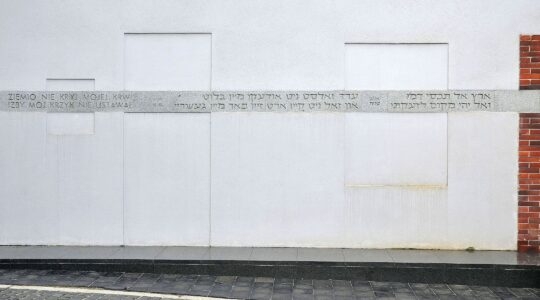JERUSALEM (JTA) – Underscoring the vulnerability of the 7,000 or so Falash Mura waiting in Ethiopia to make aliyah, the main Jewish aid compound in the country was shut down for nearly two weeks after locals persuaded Ethiopian authorities that the compound was a public nuisance and operating illegally.But the facility in Gondar – which provides schooling, Jewish education, some food aid and some employment assistance to the Falash Mura who live in adjacent neighborhoods – was reopened March 30 after being closed for two weeks following pressure on the Ethiopian government by American Jewish federation leaders. In a letter sent to Ethiopia’s ambassador to the United States, eight Jewish federation leaders wrote that local complainants constituted an illegally elected community leadership and that they essentially were troublemakers intent on disrupting the orderly aliyah process.”The illegally elected new leadership is headed by individuals not eligible for emigration to Israel,” the federation executives, led by Stephen Hoffman, president of the Jewish Community Federation of Cleveland, wrote. “If this illegally elected leadership remains, the compound’s programs will not receive our funding, as we cannot trust our funds to people whose integrity and ability to handle money honestly is in grave doubt.”The multi-site Gondar aid compound is funded by the North American Conference on Ethiopian Jewry, or NACOEJ, but has been run by intermediaries since the New York-based group was barred from operating in Ethiopia following legal troubles two-and-a-half years ago.Those legal problems and a dispute with the local community forced the closure of NACOEJ’s other Ethiopian aid compound, in Addis Ababa, in late 2004. That compound remains closed.NACOEJ does not sponsor any aid facilities in Ethiopia other than the multi-site Gondar compound.The closure appears to have been prompted by a fight among locals interested in control over the substantial aid money being spent there — an estimated $1 million per year in a desperately impoverished country where most people make about $1 per day — and greater say over who is and who is not eligible for aliyah.This comes despite the fact that community leaders have no say in determining who is eligible to immigrate to Israel and that American Jewish groups have pledged not to fund any renegade communal leadership. “It is my understanding that there are competing factions within the Ethiopian community itself who have called into question the leadership of the compounds,” said Doron Krakow, the United Jewish Communities’ senior vice president for Israel and overseas affairs, who happened to be in Gondar on March 19, the day the compound was shuttered. “Those who are interested in impugning the local leadership of the compound are looking for any way possible to knock these guys out.”Until the compound was reopened, officials from Jewish groups in Ethiopia — including the Jewish Agency for Israel, which manages immigration to Israel; the American Jewish Joint Distribution Committee, which provides the Falash Mura with medical care; and the UJC federation umbrella group, which sponsors aid operations for the Falash Mura — said they were monitoring the situation closely to respond quickly to any developing humanitarian needs. This was not the first crisis for the Gondar facility. Last May the compound’s local director, Getu Zemene, was arrested following an internecine dispute over control of the compound, and the facility was shut down for a few days. Zemene was soon released and the compound was reopened. Several weeks ago, however, Ethiopian authorities issued a formal order to close the Gondar compound, leaving 7,000 Falash Mura without aid services.The Falash Mura are Ethiopians of Jewish ancestry whose progenitors converted to Christianity several generations ago to escape economic and social pressures. They and their families now are turning to Judaism in a bid to come to Israel, and they have been emigrating at a rate of 300 per month.Since the 1990s, the prospect of immigration to Israel has prompted tens of thousands of Ethiopian farmers and craftsmen to leave their rural villages and relocate to Gondar, where the Israeli Interior Ministry verifies their eligibility for aliyah.Many of them have found the move to the city difficult and have availed themselves of local Jewish aid services. NACOEJ heralds these operations as a bulwark against penury and starvation.Others, however, argue that the aid has fostered the development of a welfare-dependent population, encouraging the impoverishing move to the city and hindering the Falash Mura from developing independent sources of food and income in Gondar.While the Israeli government estimates that some 7,000 Falash Mura remain in Ethiopia, some advocates of Ethiopian aliyah contend that the number is more than twice that.In the past, locals have tried to wrest control of the Gondar compound through allegations of corruption, intimidation and violence, and armed guards had been stationed at some of the facilities’ entrances.Similar problems, along with a dispute between local employees and NACOEJ’s directorship, led to the closure of NACOEJ’s Addis Ababa aid compound.
JTA has documented Jewish history in real-time for over a century. Keep our journalism strong by joining us in supporting independent, award-winning reporting.





